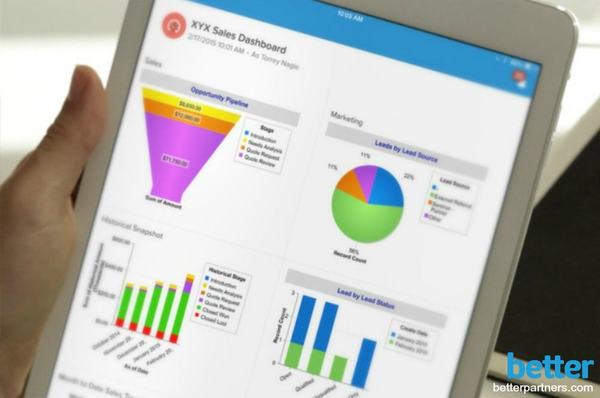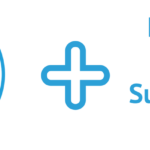We’ve seen it time and time again – a company invests in valuable tools like Salesforce and they end up dissatisfied with the product. Why? They’re not using it properly, which means they’re not getting the results they need or expected. In most cases, we can pinpoint the problem: bad data in = bad data out.
The business has spent a lot of money, time, and energy on something that will continue to fail if their people aren’t updating true and accurate data in a timely fashion. If you are striving to develop an accurate, useful dashboard for your business using Salesforce, you’ve got to get your team to adopt good data practices. Sound like an uphill battle? Here’s what we know will work:
Show Your People What to Report On

Give your employees a clear understanding of what information you need them to report. It might be a daily call report, a list of prospects, a sales forecast, etc. Most Sales Managers hold a one-on-one or team meeting each week to take time to look at Salesforce. This helps to reinforce that the info they’re reporting is valuable.
Let People Know When
If you say that you’re going to run reports every Thursday at 3pm, then you need to run reports every Thursday at 3pm. It sets a clear expectation for your team to be accountable to updating their numbers on time, every time. While there is no right or wrong time for a business to input information, you must be consistent, and you must give feedback on data as soon as possible. No procrastinating. No incomplete reports. Just good data that allows you to make good, timely decisions for the business.
Set The Expectation Up Front
From day one on the job, make sure your people know that good data practices are a company-wide standard. Make this a part of their job description and – more than anything – hold them accountable. When you consistently review your reports and dashboards with your team during meetings, you model the importance of data being entered accurately and on-time. Clear consequences for failing to meet targets should be enforced, and rewards for meeting and exceeding KPI’s will reinforce your team’s accountability.
If You Put In Good Data, You Get Good Data Out
Data is everything. There are consequences when businesses fail to report good (accurate) data. You use your dashboard to know where you’ve been, where you currently are, and where you’re going. When someone on your team fails to report their numbers, you now have inaccurate and incomplete data. It’s like having your GPS malfunction, leading you in the wrong direction completely. And that’s not doing your business any favors.
Access Accurate Information At Any Time

Don’t let your sales teams tell you they don’t have time to report their numbers, or it doesn’t impact sales! They do, and it does. For example…
Your business is growing, and you know it’s time to hire a sales person. You bring on Joe, and he’s hustling – keeping the rest of your business as busy as he is. How do you know that nothing is falling through the cracks? Follow up can be challenging, and by training Joe to enter good data from the beginning, you’ve set him up to get automated reminders for who to call next and who to follow up with today, which make him, and you, more successful.
Now, let’s pretend that Joe wins the lottery, quits his job on the spot, and moves to the Caribbean. Good for Joe. Not good for your business – unless Joe has been hardwired to report good data. This means, the next guy in his role can access accurate information from your sales pipeline from day one. He’ll be fully on boarded more quickly, and sell more successfully in less time.
Can Good Data Predict The Future?
Yes! Tracking patterns and trends in sales, expenses, and performance can predict the future. One of the most straightforward ways that good data can help you predict the future is for hiring purposes. By being able to look at trends from the past and where you are presently, you can make a well-informed decision that supports and expands your team. If you’ve got inaccurate numbers, you may not actually be able to support that new hire, and end up in layoff mode. No one wants to be in that position.
Another way good data can predict the future is in marketing and expanding service lines. If you’re not really paying attention, you may not realize that 90% of your revenue is coming from a very specific sector, giving the impression to potential customers that you only work with that sector. By knowing exactly where you are in the marketplace, you can plan more effective sales and marketing campaigns to penetrate new markets, and grow your business.
Don’t Blame Technology
Your business can’t figure out where it’s going if you don’t know where you’ve been, or where you are today. The numbers matter. If you need help telling your business story through good data, or guidance on how to get your people to adopt good data practices, we’ve got your back! We’ve seen it all – the good, the bad, and the ugly – and we know one thing for certain: good data going in = smart, effective data coming out. Hope you enjoyed our blog on Getting Your Employees To Adopt Good Data Practices!
Contact Better Partners for more Salesforce tips or business consultation on adopting good data practices!







